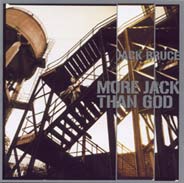
Jack Bruce
More Jack Than God
(Sanctuary)
One
of the most innovative and versatile instrumentalists in the history of rock,
nowadays Jack Bruce doesn’t get a lot of space in the press. The giant supergroup
of which he was once a big part – Cream, of course – doesn’t seem to be on
the verge of being rediscovered. Not even the very fine re-release program
which a few months ago made it possible for young people to see masterpieces
such as Songs For A Tailor (1969), Harmony Row (1971), Out Of The Storm (1974),
and the very good follow-up How’s Tricks (1977), mentioned in print for the
first time, seems to have made any difference.
It
was after How’s Tricks that something changed – and I imagine that money/manager
issues must have taken their toll. Anyway, albums like I’ve Always Wanted
To Do This (1980 – given the content, I’ve never seen a strangest title) and
Automatic (1983 – Jack Bruce in the era of the Fairlight) showed an artist
which seemed to have lost his way.
Maybe
the inspiration for change was the collaboration with Kip Hanrahan – as a
bass player and – especially – vocalist Bruce became a big part of his "Cuban
eroticism" saga – check albums like Desire Develops An Edge and Vertical’s
Currency (both 1986). A bit later, A Question Of Time (1989) showed that Bruce
had found the thread, if not his freshness or taste for innovation.
Given
the indifference that the press reserves for people like Bruce (not really
a problem that’s music-related, I think), and given the presence of the "nostalgia
circuit" with its own kind of material rewards (a lot less than those
Fate has given to Eric Clapton, his old colleague), the fact that Bruce managed
to release MonkJack (1995) was quite amazing. Only his piano and vocals, plus
Bernie Worrell’s Hammond B-3 Organ, for a series of fine originals and some
remakes.
Which
of course brings us to the big question: what’s the point in making records
if nobody reviews them? In fact, the follow-up, Shadows In The Air, appeared
in 2001. In a way, the album revisited the Cuban atmospheres of Hanrahan’s
work (and in fact he co-produced the work with Bruce), but results were not
what I had expected. The musicians were good, ditto for some "special
guests" (Eric Clapton, Gary Moore, Vernon Reid, Dr. John), but the percussions
and Cuban rhythm sounded like they had been added to the tunes, not organically
linked; and they were totally wrong for the Cream tunes (Sunshine Of Your
Love and White Room, which I imagine were there mostly for commercial reasons)
and for some songs off his old songbook (He The Richmond, Boston Ball Game
1967, Out Into The Fields). The he went on tour.
Now
that maybe it doesn’t really matter anymore save for some hard-core fans,
Bruce has released an album that’s pretty good. All those concerts must have
been good for the line-up – most of the times, a percussion player and two
drummers, Vernon Reid’s guitar, Bernie Worrell’s Hammond and Bruce on bass,
piano and vocals. More Jack Than God opens and closes with two tracks with
a fine trance-like atmosphere (So They Invented Race, Lost In The City); there
are a lot of very good songs: "ballads" (Kelly’s Blues, The Night
That Once Was Mine), the blues (Uh, Oh!), sad songs of concentrated moods
(Progress, Milonga Too), all well played, all extremely well sung. And even
the Cream covers fare well: Politician sports a fine Hammond solo, We’re Going
Wrong builds on the tension of the original, I Feel Free is pleasantly light.
Beppe
Colli
©
Beppe Colli 2003
CloudsandClocks.net
| Oct. 7, 2003


